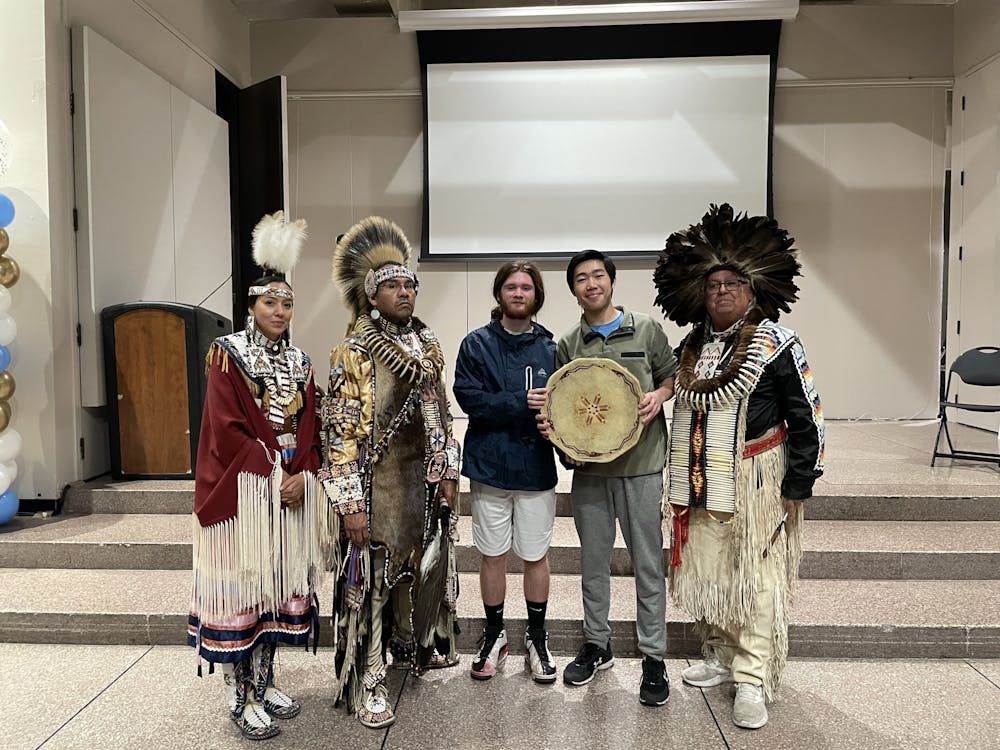On Oct. 14, the Center for Diversity and Inclusion hosted a program from 3–8 p.m to honor Indigenous Peoples’ Day, with a focus on Indigenous innovation and impact. The program included a community gathering event, followed by a celebration event featuring a keynote presentation from Dr. Donald Warne — co-director of the Johns Hopkins Center for Indigenous Health — and a performance from the Piscataway Nation Singers & Dancers.
In an interview with The News-Letter, Mary Rose Petron, the Associate Director of Multicultural Affairs for the Center for Diversity and Inclusion, discussed the focus of this year’s celebration.
“I wanted to highlight this year's theme, which is Indigenous impact and innovation. There is so much indigenous impact within our healthcare system today. For example, the invention of Pedialyte,“ they said. “Celebrating Indigenous heritage encompasses not only the art, but also the dance, music, singing, and all the other beautiful elements that come together to honor these traditions.”
The community gathering featured vendors promoting Indigenous resources and food. Students were invited to drop in and learn about local Indigenous community organizations and their work.
At 6 p.m., the celebration transitioned to the Glass Pavilion, where Warne gave a presentation on the importance of celebrating Indigenous impact to an audience of students, faculty and community members.
“As we commemorate this occasion today, we honor the ancestors who have paved the way for us, and their wisdom, traditions and sacrifices are the foundations upon which indigenous communities stand today,” he said. “By remembering them, we reaffirm our commitment to understand and support Indigenous rights and sovereignty.”
Warne also highlighted the contributions of the Center for Indigenous Health, particularly its transformative public health programs and policy advocacy initiatives. He discussed how efforts such as the maternal and child health programs and vaccine research are designed to generate knowledge and drive policy improvements.
“We don't just end with research and publications. We need to use that data to advocate for better policies and to improve outcomes. One area we are working on is how traditional healing services could potentially be billable under Medicare and Medicaid,“ he said. “We have some tremendous traditional healers and traditional medicine. We know that their work is very effective, but it's not sustainable because they are not generating revenue to support their work.”
Looking ahead, the center aims to elevate Indigenous health leadership globally. Warne announced that Hopkins will soon offer a doctorate degree in Indigenous Health — the first of its kind worldwide.
In an interview with The News-Letter, Dawson Fontenot, a freshman studying public health, discussed his motivation to attend the event.
“I am from the capital city of the Cherokee Nation in Tahlequah, Oklahoma and wanted to feel connected to the Indigenous community here at Hopkins. I do not think that Indigenous culture is sufficiently valued enough today, and there can be more done to celebrate like a campus powwow,” he said.
The celebration concluded with a performance by the Piscataway Nation Singers & Dancers. Before each dance and song, Chief Mark Tayac — the 29th generation of Hereditary Chiefs of the Piscataway People — shared a remark on Indigenous culture.
“We are the Indigenous people of this land and we are still here. We never left and we have survived as a people. For 15,000 years, what is known today as the Chesapeake region has been our home,” he said. “We travel all across the States, sharing our traditions to build bridges of friendship, cooperation, mutual understanding, and education.”
In an interview with The News-Letter, freshman Jason Yu discussed what resonated most with him about the Tayac’s talk.
“I related to what Chief Tayac mentioned on how Hollywood and 21st century western media often has a skewed portrayal of Native culture,“ he said. “The truth is far from what is shown on TV. Native culture is so rich and something that we as residents of this land should learn about and recognize.”
Students expressed gratitude to the performers at the end of their show and shared their appreciation of the event.
“I liked the performance — it was a different style of dance then what I do in powwows. I really liked the event — it made me feel like I was back home again,” Dawson said.
“What happened tonight was the sharing of culture, one of the fundamental pillars that make us who we are today,” Yu said.





